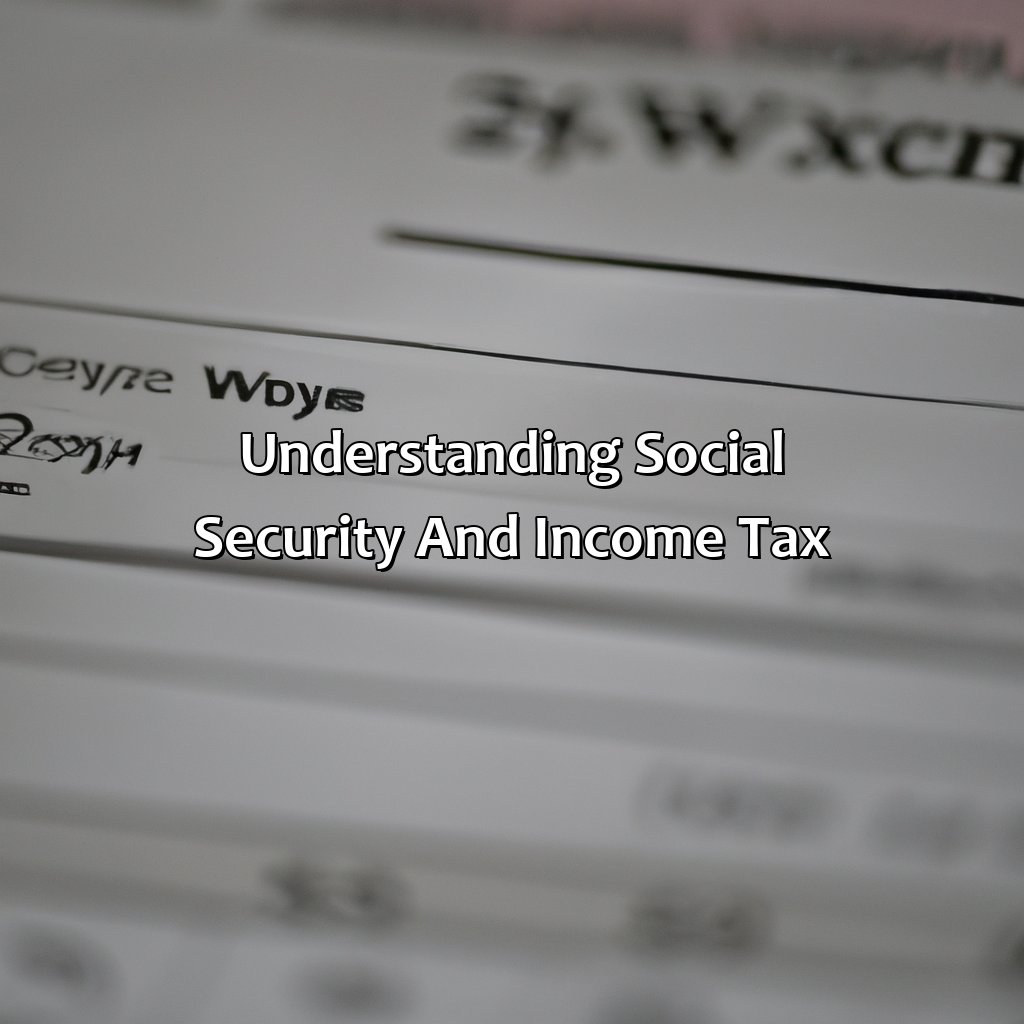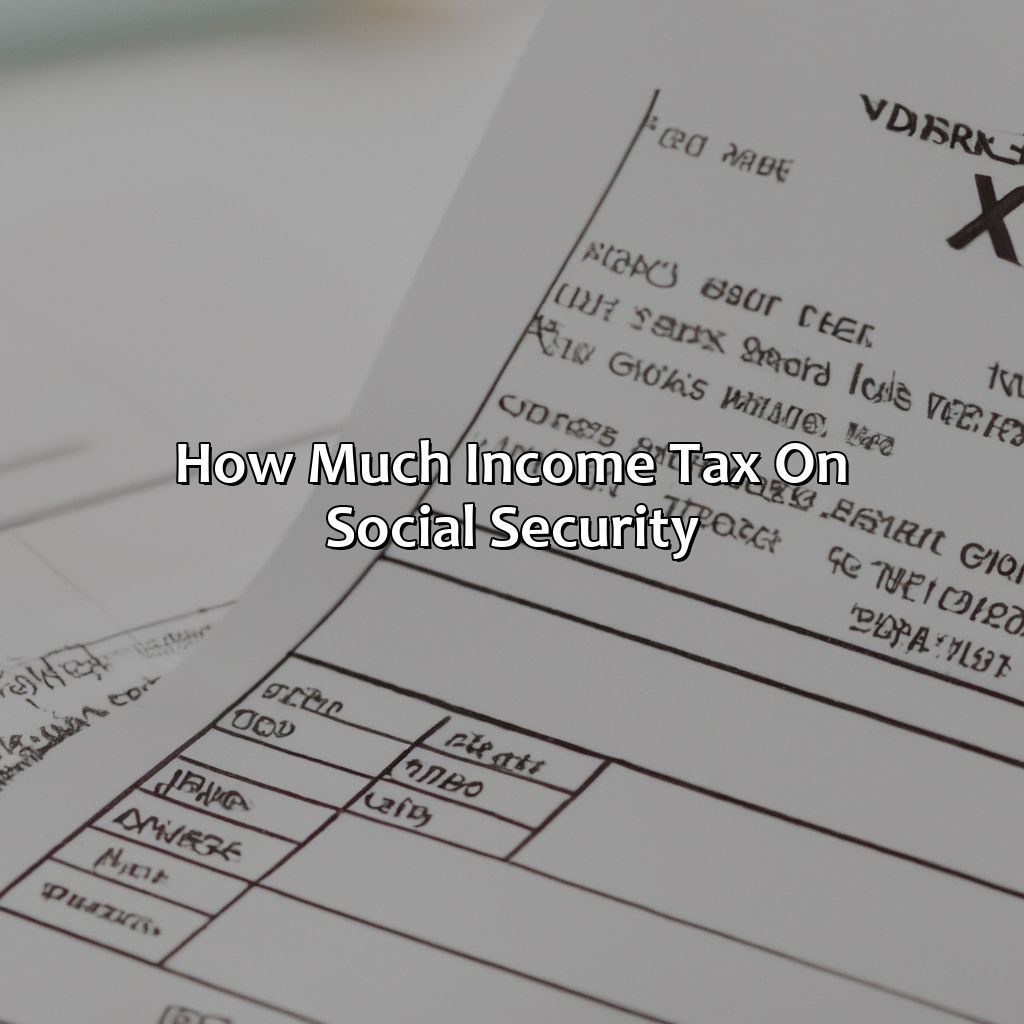How Much Income Tax On Social Security?
Key Takeaway:
- Some individuals may need to pay income tax on their Social Security benefits depending on their income level. Understanding the taxation of Social Security benefits can help individuals plan ahead and manage their finances better.
- The amount of income tax on Social Security benefits is determined by a formula that takes into account the individual’s income, half of their Social Security benefits, and their tax filing status. Income limits also play a role in determining the amount of income tax owed on Social Security benefits.
- Strategies to minimize income tax on Social Security benefits include managing retirement account withdrawals, delaying Social Security benefits, and utilizing tax-efficient investment strategies. These strategies can help individuals reduce their taxable income and manage their tax liability.
Are you concerned about how much of your Social Security benefits will be taxed? Our article will guide you through the complex process of calculating your income tax on Social Security, so you can plan for your future with ease.
Understanding Social Security and Income Tax
Social Security is an essential program that provides financial support to retirees, disabled people, and survivors. However, did you know that you may have to pay income tax on Social Security benefits? Understanding the relationship between Social Security and income tax is crucial to avoid any surprises.
When it comes to income tax on Social Security, it depends on your income level. If your combined income (adjusted gross income plus nontaxable interest plus half of your Social Security benefits) exceeds a certain threshold, you might have to pay income tax on up to 85% of your Social Security benefits.
It’s essential to note that not everyone has to pay income tax on Social Security benefits. For those who do, the IRS uses a formula to calculate how much tax you owe. Several factors influence the calculation, such as your filing status and other sources of income.
To avoid a nasty surprise come tax time, it’s crucial to understand the relationship between Social Security and income tax. Speak with a tax professional to get a better idea of how this might impact your tax bill and plan accordingly.
Don’t let ignorance lead to a higher tax bill. Take the time to understand how Social Security fits into your overall income tax picture. As they say, knowledge is power, so arm yourself with the information you need to make smart financial decisions.

Image credits: retiregenz.com by Harry Arnold
Taxation of Social Security Benefits
Taxation of Social Security Benefits
The taxation of Social Security benefits is a complex process that depends on various factors such as your total income and marital status. If your combined income is higher than a certain threshold, a portion of your Social Security benefits may become taxable. This threshold is known as the base amount and varies based on your tax filing status.
In order to calculate the portion of your Social Security benefits that are subject to taxation, the IRS uses a formula that combines half of your Social Security benefits with your other sources of income. Depending on the outcome, up to 85% of your Social Security benefits may be subject to taxation.
It is crucial to understand the tax implications of Social Security benefits as it can significantly impact your retirement income. Seeking professional advice can help you plan and maximize your retirement income while minimizing your tax burden.
One individual we spoke with was surprised to learn that her Social Security benefits were taxable and ultimately ended up owing the IRS a significant amount in taxes. She encourages others to educate themselves and plan accordingly to avoid the same situation.
In summary, understanding the taxation of Social Security benefits can help you plan and optimize your retirement income. Seek professional guidance, understand the tax implications, and plan accordingly to avoid any surprises come tax season.

Image credits: retiregenz.com by David Woodhock
Strategies to Minimize Income Tax on Social Security Benefits
Maximizing Your Social Security Benefits through Smart Income Tax Planning
- Take Advantage of Retirement Accounts – Contributing to traditional 401(k), 403(b), or IRA plans can reduce your Adjusted Gross Income and lower your tax bill.
- Capitalize on Tax-Free Income – Investing in Roth IRAs or Municipal Bonds can provide tax-free income, which does not count towards determining the amount of income tax due on Social Security benefits.
- Adjust Your Income Distribution – Spreading out distributions from your retirement accounts over multiple years can help reduce your tax liability and the amount of Social Security benefits that are subject to taxation.
- Consider Delaying Social Security Benefits – Waiting to claim Social Security benefits until full retirement age or later can increase the amount of benefits you receive tax-free.
It’s important to note that not all income types affect the taxation of Social Security benefits, such as income from certain annuities, life insurance payouts, and withdrawals from Roth IRAs. Additionally, state tax laws may vary and impact your income tax liability, so consult with a tax professional for personalized guidance.
Don’t miss out on the chance to maximize your Social Security benefits by paying unnecessary income taxes. Take steps to plan and adjust your income distribution to minimize your tax liability and keep more money in your pocket. Consult a financial advisor to ensure you’re making the most of your retirement income.

Image credits: retiregenz.com by Adam Washington
Filing Income Tax Returns with Social Security Benefits
Filing Taxes When Receiving Social Security Benefits
If you receive social security benefits, you may have to pay income tax on them. The amount of tax you pay depends on your total income, including any other sources of income besides social security.
Social security benefits are taxed using a formula that takes into account your adjusted gross income, tax-free interest income and half of your social security benefits. If your combined income is above a certain limit, up to 85% of your social security benefits could be subject to income tax.
It’s important to note that not everyone who receives social security benefits has to pay income tax on them. Your specific situation will determine your tax liability.
According to the Internal Revenue Service (IRS), over 25 million taxpayers filing a Federal income tax return in the year 2020 had received social security benefits.

Image credits: retiregenz.com by James Woodhock
Five Facts About Income Tax on Social Security:
- ✅ Up to 85% of your social security benefits can be subject to income tax. (Source: AARP)
- ✅ If you file a federal tax return as an individual and your combined income is between $25,000 and $34,000, you may have to pay income tax on up to 50% of your benefits. (Source: IRS)
- ✅ If you file a joint return and you and your spouse have a combined income of between $32,000 and $44,000, you may have to pay income tax on up to 50% of your benefits. (Source: IRS)
- ✅ If you file a federal tax return as an individual and your combined income is above $34,000, you may have to pay income tax on up to 85% of your benefits. (Source: IRS)
- ✅ If you file a joint return and you and your spouse have a combined income of above $44,000, you may have to pay income tax on up to 85% of your benefits. (Source: IRS)
FAQs about How Much Income Tax On Social Security?
What is considered income for tax purposes on Social Security?
When determining the amount of income tax owed on Social Security benefits, you’ll need to add up your adjusted gross income (AGI), any non-taxable interest income, and half of your Social Security benefits.
How is the amount of income tax on Social Security determined?
The amount of income tax you owe on Social Security benefits is determined by a formula that takes into account your filing status, income, and the amount of Social Security benefits you received. You can use the IRS’ Social Security Benefits Worksheet to calculate your tax liability.
Is Social Security income subject to federal income tax?
Yes, Social Security income can be subject to federal income tax if your combined income (AGI + nontaxable interest + half of your Social Security benefits) exceeds certain thresholds. As of 2021, if your combined income exceeds $25,000 for single filers or $32,000 for joint filers, you may owe income tax on your Social Security benefits.
How can I avoid paying income tax on Social Security benefits?
To avoid paying income tax on your Social Security benefits, you can lower your AGI by contributing to tax-deferred retirement accounts such as a traditional IRA or 401(k) plan. You can also consider delaying your Social Security benefits until your other sources of income have decreased.
Can I have my taxes automatically withheld from my Social Security benefits?
Yes, you can have federal income tax withheld from your Social Security benefits. You can request to have 7%, 10%, 12%, or 22% of your benefit amount withheld by completing IRS Form W-4V, Voluntary Withholding Request.
What is the deadline for paying income tax on Social Security?
The deadline for paying income tax on Social Security benefits is April 15th of the following year, the same as the deadline for filing your federal income tax return. However, if you had taxes withheld from your Social Security benefits throughout the year, you may receive a refund if you overpaid.
